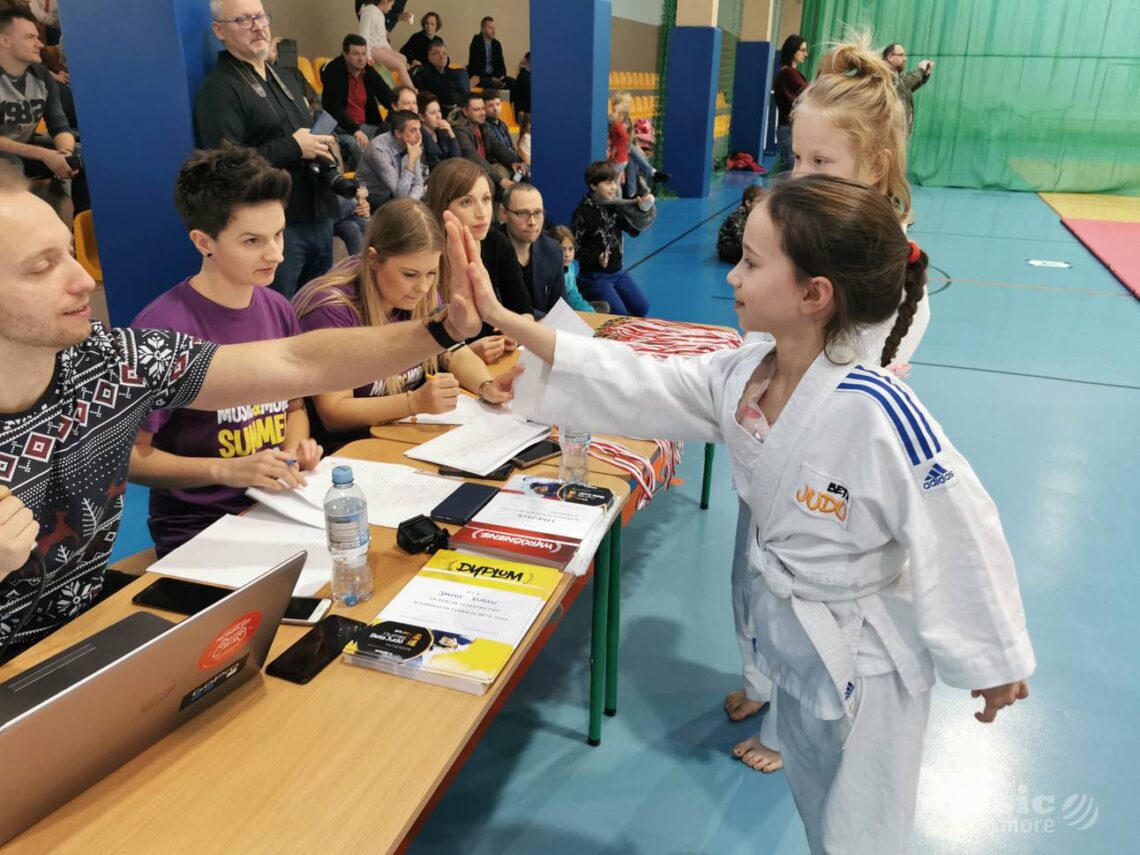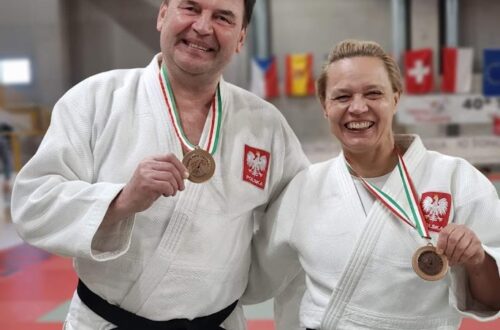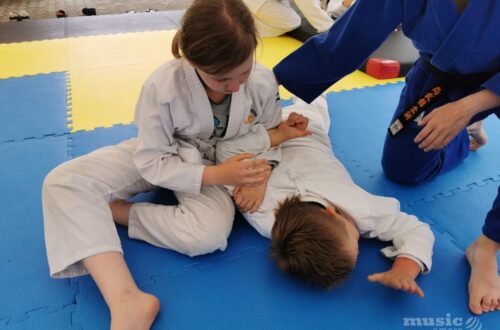
Mój drogi Rodzicu, (czasem) robisz to źle!|My dear Parent, (sometimes) you are doing it wrong!
Kochany Rodzicu adepta sztuk walki!
Wyobraź sobie taką sytuację:
Przez lata woziłeś swoje dziecko na treningi.
Wydawałeś mnóstwo pieniędzy na starty w zawodach, nowe keikogi, ochraniacze.
Spędzałeś wiele godzin na bezlitosnym popychaniu swojego dziecka do przekraczania jego granic.
Aż pewnego dnia…
Odchodzi. Rezygnuje z treningów, rezygnuje ze sztuk walki.
Twoje biedne rodzicielskie serduszko krwawi. Jesteś zszokowany. Próbujesz przekonać swoje dziecko, że musi trenować dalej, bo przecież tak dobrze mu idzie. Przecież jest już zbyt daleko by zrezygnować. Nie ma odwrotu.
Kolejny strzał w kolano.
Zaczynasz zadawać sobie pytanie: „gdzie popełniłem błąd?”
Powiem Ci co zrobiłeś źle:
Zapomniałeś o tym, co jest najważniejsze – zabawa i radość.
Teraz powtórz za mną:
DZIECI NIE SĄ FIZYCZNĄ MANIFESTACJĄ MOICH NIESPEŁNIONYCH AMBICJI.
Spójrz:
Przez wiele lat moich treningów widziałam wiele utalentowanych dzieciaków, które straciły entuzjazm i radość z treningów a potem zrezygnowały. Działo się tak ponieważ ich rodzicie wysysali z nich tę radość, obciążając swoimi ogromnymi wymaganiami. Wywierali na nich presję. Traktowali swoje dzieci jako ludzkie cegły w zbudowaniu muru o nazwie „rodzicielska duma i chwała”.
Jeśli sukces Twojego dziecka (czy to w sztukach walki, hokeju, piłce nożnej) jest tylko symbolem statusu społecznego, to nie jest dobrze.
Ale nie martw się. Wciąż jest nadzieja. Jedyne co musisz zrobić to okazać swojemu dziecku wsparcie.
Psychologowie twierdzą, że są 3 podstawowe zwroty, których matki i ojcowie powinni używać przed czy też po zawodach, imprezach, sprawdzianach.
- Baw się dobrze.
- Daj z siebie wszystko.
- Jestem z ciebie dumny.
Podarowanie dziecku listy pt.: „co robisz źle i jak to naprawić” nie jest wskazane.
Od tego jest trener.
Tymczasem rodzice są mistrzami we wtrącaniu się we wszystko, i wchodzeniu w kompetencje innych osób. Niestety, na sali treningowej widać to aż nazbyt wyraźnie.
Ja od paru lat zabraniam rodzicom siedzieć na sali w czasie treningu – no chyba, że są to rodzice-aniołki, którzy nie wtrącają się w moją pracę. Nie zliczę ile razy jakaś miła kobieta z ławki pod ścianą krzyczała, bądź konspiracyjnym-zupełnie-nie-szeptem mówiła do swojego dziecka, co sknocił w technice. Godne podziwu, że na tyle się zaangażowała, by dostrzec różnice między techniką wykonaną przez trenera, a przez swoją pociechę.
Jednak zbędna ingerencja.
Przede wszystkim dlatego, że na sali treningowej od zwracania uwagi jest ktoś inny. Ale również dlatego, że to bardzo krzywdzące dla owego dziecka. Spójrzmy na to z jego punktu widzenia: czy to nie jest dziwne, że tylko jemu rodzic zwraca uwagę? „Pozostałe dzieci chyba robią wszystko super, a tylko ja schrzaniłem. Jestem do niczego„. Kilka razy musiałam wysłuchiwać dzieci, które czuły się pokrzywdzone przez takie traktowanie, następnie przekazywałam te informacje rodzicowi, bo dziecko bało się go rozczarować.
Rodzicu! Twoim zadaniem jest wspieranie swojej pociechy. Dzięki temu jest szansa, że Twoje dziecko będzie chciało dalej trenować, zdobywać kolejne stopnie szkoleniowe, wyróżnienia, medale na zawodach.
Chciało, ale nie musiało. To jest ta subtelna różnica.
Do wielkości nie można zmusić nikogo. Ona wyrasta z radości praktykowania.
_____________________________________________________
Dear Parent, a martial arts adept!
Imagine this situation:
You’ve been driving your child to training for years.
You spent a lot of money starting in competitions, new keikogi, boots.
You spent hours and hours mercilessly pushing your child to overstep his boundaries.
Until one day …
Goes away. He quits training, quits martial arts.
Your poor parental heart is bleeding. You are shocked. You’re trying to convince your child that he has to keep training because he is doing so well. After all, it’s too far to quit. There is no turning back.
Another shot in the knee.
You start to ask yourself, „where did I go wrong?”
I’ll tell you what you did wrong:
You forgot what is most important – fun and joy.
Now repeat after me:
CHILDREN ARE NOT A PHYSICAL MANIFESTATION OF MY FILLED AMBITIONS.
Look:
For many years of my training, I have seen many talented kids lose their enthusiasm and joy from training and then quit. It was because their parents sucked that joy out of them, burdening them with their enormous demands. They put pressure on them. They treated their children as human bricks in building a wall called „parental pride and glory.”
If your child’s success (be it in the martial arts, hockey, or soccer) is just a status symbol, that’s not good.
But do not worry. There is still hope. All you have to do is support your child.
Psychologists say there are 3 basic phrases mothers and fathers should use before or after competitions, events, and tests.
- Have fun.
- Do your best.
- I’m proud of you.
Giving your child a list „what are you doing wrong and how to fix it” is not advisable.
That’s what the coach is for.
Meanwhile, parents are masters of meddling in everything and getting into the competences of other people. Unfortunately, you can see it all too clearly in the training room.
For several years, I have forbidden parents to sit in the room during training – unless they are angel parents who do not interfere with my work. I do not count how many times a nice woman from the bench by the wall shouted, or conspiratorially completely-not-whispering to her child, which he screwed up in technique. It is admirable that she got involved enough to notice the difference between the technique performed by the trainer and by her child.
However, unnecessary interference.
First of all, because there is someone else to do that, in the training room. But also because it is very harmful to the child. Let’s look at it from his point of view: isn’t it strange that only his parent pays attention to him? „The other kids seem to be doing everything great, and I’m the only one who screwed up. I’m a sucker.”
Several times I had to listen to children who felt wronged by such treatment, then I passed this information on to the parent because the child was afraid to disappoint him.
Parent! Your task is to support your child. Thanks to this, there is a chance that your child will want to continue training, gain further training degrees, awards, medals at competitions.
It wanted to, but did not have to. This is the subtle difference.
No one can be forced to greatness. It grows out of the joy of practicing.





